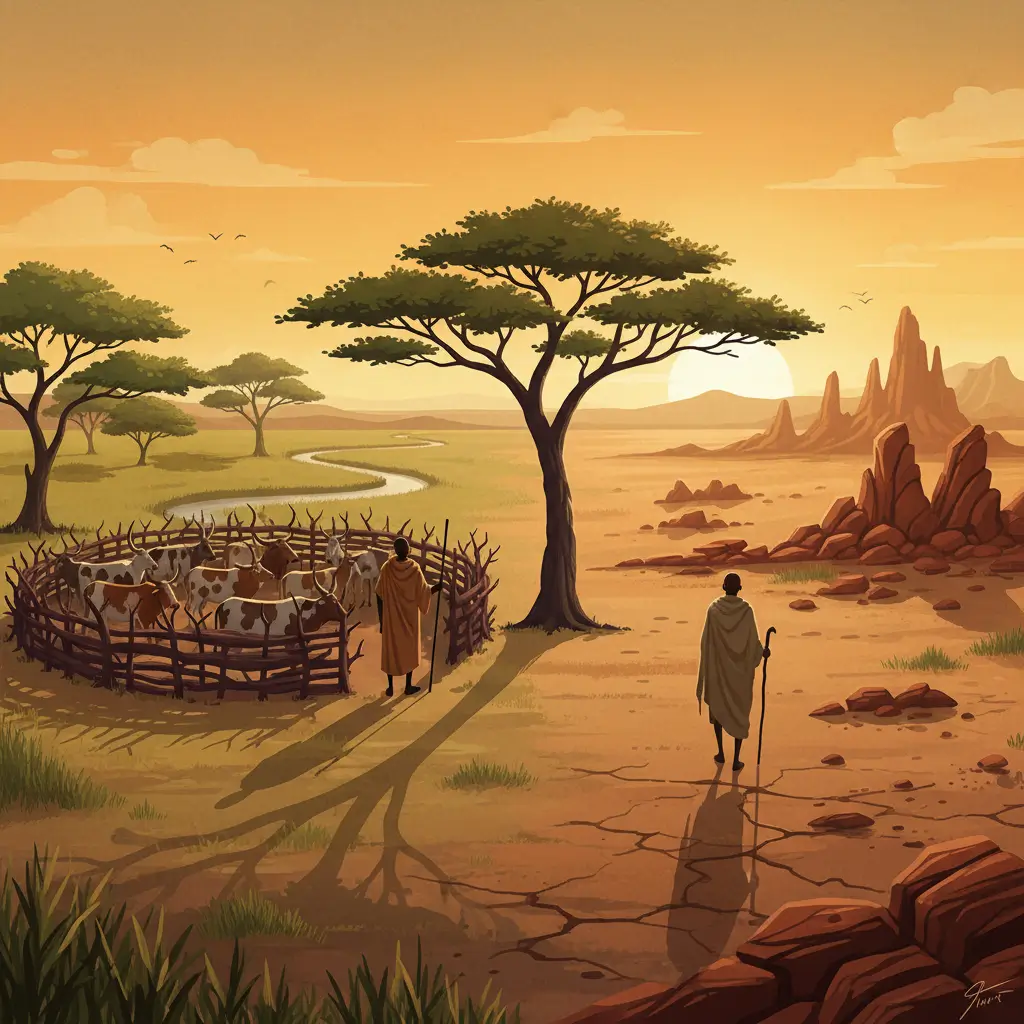Long ago, when the world was young and the stars were still learning their places in the sky, there lived two brothers in the vast wilderness of southern Africa. Though born of the same mother, they could not have been more different in both body and spirit.
The first brother had been blind since birth, his eyes sealed shut by the hands of fate. Yet what he lacked in sight, he possessed tenfold in wisdom and understanding. His other senses had grown sharp as flint—he could smell the morning dew on distant grass, hear the heartbeat of a sleeping antelope, and feel the vibrations of life through the soles of his feet.
The second brother was blessed with keen eyesight that could spot a bird's nest in the highest branches or track a wounded animal across rocky terrain. He was a hunter, proud and relentless, spending his days pursuing game with spear and snare. His life was one of constant movement, always seeking the next quarry.
One fateful morning, as the hunter brother ranged far from their settlement, he discovered something extraordinary. Hidden beneath a cluster of thorny bushes was a hole in the earth—not just any hole, but one that seemed to breathe with life. From its depths emerged the most beautiful creatures he had ever seen: sleek animals with spotted coats and gentle eyes, followed by their small, wobbling young.
Without hesitation, the hunter raised his spear. His nature compelled him to kill, and so he struck down several of the young creatures, dragging their bodies back to show his blind brother.
The Blind Man's Wisdom
When the blind brother felt the warm bodies and inhaled their scent, he shook his head gravely. His experienced hands moved over the creatures, feeling their soft hides and sturdy builds.
"Brother," he said with certainty, "these are not wild game. These are cattle—domesticated animals meant to serve and nourish us while alive, not to be hunted like wild beasts."
The Miracle of Sight
That very night, as if rewarded for his wisdom and restraint, the blind brother's eyes opened for the first time. The world flooded in with color and light, overwhelming yet beautiful. When dawn broke, he insisted they return to the mysterious hole together.
There, with his newfound sight, he saw the truth: these were indeed cattle, magnificent cows with their calves, emerging from what appeared to be an underground passage to graze in the early morning light.
Understanding the gift they had been given, the formerly blind brother acted swiftly. He gathered thorny branches and built a strong kraal—a circular fence that would keep the cattle safe from predators while allowing them to graze. This was the first domestication of cattle in their land.
Following the ancient traditions of his people, he prepared sacred ointments from animal fats and fragrant plants, anointing himself as the Hottentots had done for generations. The ointment marked him as a keeper of cattle, a man of settled ways and accumulated wealth.
When the hunter brother returned from his increasingly difficult hunts—for the wild game had grown scarce and wary—he saw his brother's prosperity with envious eyes. The cattle provided milk, meat when needed, and hides for clothing. The formerly blind man had become rich while the hunter grew thin and desperate.
"Brother," pleaded the hunter, "share with me the secret of this ointment. Let me too become a keeper of cattle."
The wise brother looked at him with pity and cunning. "Very well," he said, "but the ointment must be properly prepared. You must throw it into the fire first to activate its power, then gather the melted remains and anoint yourself."
Desperate and trusting, the hunter brother followed these instructions. He cast the precious ointment into the flames, and immediately the fire roared up like an angry spirit. The flames licked at his face and hands, burning him terribly and leaving him scarred and wild-looking.
Crying out in pain and anger, he tried to escape, but his wise brother called after him: "Take this kirri"—holding up a knobstick of hard wood—"and run to the hills. There you will find honey in the rocks and roots to sustain you. That shall be your lot."
And so it was that the two brothers parted ways forever. The wise brother became the ancestor of the pastoral peoples, those who kept cattle and lived in settled communities, accumulating wealth and wisdom through the generations.
The burned brother, scarred and wild, fled to the harsh hills and desert places. There he learned to survive on wild honey, roots, and small game. His descendants became the Bushmen—the San people—masters of the wilderness, living lightly on the land and knowing every secret of survival in the harshest places.
To this day, the San people are renowned for their ability to find water in the desert, to track animals across any terrain, and to live in harmony with the wild places where others cannot survive. They carry the kirri still, and they remember the ancient division that sent their ancestor to become one with the wilderness.
Thus did wisdom and wildness part ways, each finding their own path under the vast African sky.
